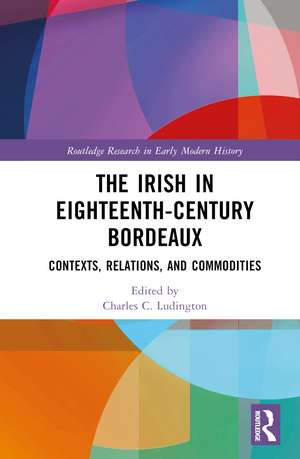The Irish in Eighteenth-Century Bordeaux: Contexts, Relations, and Commodities: Routledge Research in Early Modern History
Editat de Charles C. Ludingtonen Limba Engleză Hardback – 24 noi 2023
This volume argues that the Irish community in Bordeaux was a product of contingent factors including religious bigotry and war, but mostly because of commercial and educational opportunities that were not available in Ireland itself. This confessionally mixed Irish community made remarkable contributions to Atlantic, European, and global production, consumption, and trade, especially in Bordeaux wine.
The book will enlarge, complicate, and challenge our understanding of the eighteenth-century European and Atlantic worlds.
Students and scholars who are interested in early modern immigrant and trading communities, the impact of religious tolerance and intolerance, the development of international trade networks, and the production and meaning of commodities will find it invaluable.
Din seria Routledge Research in Early Modern History
-
 Preț: 310.22 lei
Preț: 310.22 lei -
 Preț: 298.11 lei
Preț: 298.11 lei - 9%
 Preț: 935.91 lei
Preț: 935.91 lei -
 Preț: 311.41 lei
Preț: 311.41 lei -
 Preț: 311.41 lei
Preț: 311.41 lei -
 Preț: 311.41 lei
Preț: 311.41 lei -
 Preț: 296.19 lei
Preț: 296.19 lei -
 Preț: 311.41 lei
Preț: 311.41 lei -
 Preț: 314.44 lei
Preț: 314.44 lei -
 Preț: 310.65 lei
Preț: 310.65 lei -
 Preț: 310.56 lei
Preț: 310.56 lei -
 Preț: 369.67 lei
Preț: 369.67 lei -
 Preț: 312.56 lei
Preț: 312.56 lei -
 Preț: 311.43 lei
Preț: 311.43 lei -
 Preț: 311.41 lei
Preț: 311.41 lei -
 Preț: 311.14 lei
Preț: 311.14 lei -
 Preț: 326.49 lei
Preț: 326.49 lei - 18%
 Preț: 998.71 lei
Preț: 998.71 lei -
 Preț: 416.22 lei
Preț: 416.22 lei - 26%
 Preț: 765.43 lei
Preț: 765.43 lei - 26%
 Preț: 763.78 lei
Preț: 763.78 lei -
 Preț: 382.47 lei
Preț: 382.47 lei -
 Preț: 416.09 lei
Preț: 416.09 lei - 18%
 Preț: 1000.27 lei
Preț: 1000.27 lei - 26%
 Preț: 764.62 lei
Preț: 764.62 lei - 18%
 Preț: 995.54 lei
Preț: 995.54 lei -
 Preț: 392.67 lei
Preț: 392.67 lei - 26%
 Preț: 765.43 lei
Preț: 765.43 lei - 26%
 Preț: 764.20 lei
Preț: 764.20 lei - 18%
 Preț: 1057.13 lei
Preț: 1057.13 lei - 18%
 Preț: 1000.27 lei
Preț: 1000.27 lei - 25%
 Preț: 655.13 lei
Preț: 655.13 lei - 26%
 Preț: 680.73 lei
Preț: 680.73 lei - 18%
 Preț: 1060.25 lei
Preț: 1060.25 lei - 18%
 Preț: 1054.71 lei
Preț: 1054.71 lei - 18%
 Preț: 1001.07 lei
Preț: 1001.07 lei - 26%
 Preț: 819.32 lei
Preț: 819.32 lei - 26%
 Preț: 764.20 lei
Preț: 764.20 lei - 26%
 Preț: 847.31 lei
Preț: 847.31 lei -
 Preț: 389.66 lei
Preț: 389.66 lei - 26%
 Preț: 764.20 lei
Preț: 764.20 lei
Preț: 1004.41 lei
Preț vechi: 1224.89 lei
-18% Nou
Puncte Express: 1507
Preț estimativ în valută:
192.21€ • 199.54$ • 160.28£
192.21€ • 199.54$ • 160.28£
Carte tipărită la comandă
Livrare economică 22 martie-05 aprilie
Preluare comenzi: 021 569.72.76
Specificații
ISBN-13: 9781032228075
ISBN-10: 1032228075
Pagini: 280
Ilustrații: 8 Tables, black and white; 20 Halftones, black and white; 20 Illustrations, black and white
Dimensiuni: 156 x 234 x 18 mm
Greutate: 0.57 kg
Ediția:1
Editura: Taylor & Francis
Colecția Routledge
Seria Routledge Research in Early Modern History
Locul publicării:Oxford, United Kingdom
ISBN-10: 1032228075
Pagini: 280
Ilustrații: 8 Tables, black and white; 20 Halftones, black and white; 20 Illustrations, black and white
Dimensiuni: 156 x 234 x 18 mm
Greutate: 0.57 kg
Ediția:1
Editura: Taylor & Francis
Colecția Routledge
Seria Routledge Research in Early Modern History
Locul publicării:Oxford, United Kingdom
Public țintă
Postgraduate and Undergraduate AdvancedNotă biografică
Charles C. Ludington, Visiting Associate Professor at New York University, is the author of The Politics of Wine in Britain: A New Cultural History (2013), A Long Shadow: The Story of an Ulster-Irish Family (2017), and co-editor of Food Fights: How History Matters to Contemporary Food Debates (2019). From 2015–2017 he was a Marie Curie Senior Researcher at University College Cork and Université de Bordeaux-Michel Montaigne. He is currently working on a book about Irish merchants in Bordeaux and their role in the development of Bordeaux wine and is also general editor of the book series A Cultural History of Wine.
Cuprins
1. Introduction: The Irish in Eighteenth-Century Bordeaux Section I: Emigration, Demography, and Trade. 2. The Context of Bordeaux’s Eighteenth-Century Trade with the British Isles: Its Rise, Evolution, Social, and Commercial Structures 3. The Irish Merchant Colony of Bordeaux in the Eighteenth Century 4. The Irish Merchant Community in 1757 Wartime Bordeaux. Section II: Between Two Worlds? The Relationship of the Bordeaux Irish to Bordeaux and France. 5. Concerning Patrice Mitchell, Reader of Shakespeare, and the Maintenance of English Among the Irish in Eighteenth-Century Bordeaux 6. A Jacobite Refugee Family in 18th and Early-19th Century Bordeaux: The Clarkes of Dromantine 7. The Irish College in Bordeaux and Its Connections to the Wider World. Section III: Commodities that Made the Trade: Their Meaning and Production 8. A Transatlantic Commodity: Irish Salt-Beef in the French Atlantic World 9. The Social Meaning of Claret in Eighteenth-Century Ireland 10: Inventing Grand Cru Claret: Irish Wine Merchants in Eighteenth-Century Bordeaux.
Descriere
This volume argues that the Irish community in Bordeaux was a product of contingent factors including religious bigotry and war, but mostly because of commercial and educational opportunities that were not available in Ireland itself.
